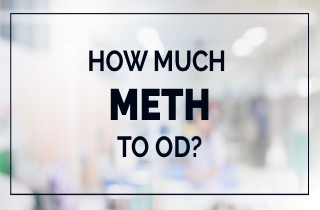The main signs of meth overdose can be difficult to recognize. This is because unlike other forms of drug intoxication, methamphetamine provides you with no immediate signs of problems. Although rarely prescribed, meth is also available as Desoxyn for medical treatment, but can also be purchased illegally. More here on meth overdose, prognosis, and death rates. Then, we invite your questions about meth use and available medical options for treating methamphetamine addiction at the end.
How does unintentional meth overdose happen?
Methamphetamine, also known as meth, is a central nervous system stimulant. Meth affects chemicals in the brain and nerves that contribute to hyperactivity and impulse control. But meth is extremely habit-forming (how does methamphetamine work), and can trigger both long-term and/or chronic use. Methamphetamine intoxication occurs when excessive amounts of the drug are administered to the body, often used in combination with other drugs or alcohol, the purity of meth is usually really high, and can result in lethal doses. So how much meth is too much?
Meth overdose – How much is too much?
A lethal dose of methamphetamine varies depending on characteristics of the drug and the user. In fact, each person has a different sensitivity to a specific amount of methamphetamine due to personal tolerance to meth. In this way, toxic levels are different for each individual. Meth overdose may also be complicated by other drugs the user may have taken. Diseases that the person may have developed also play a role due to the current health condition of the body.
- Oral administration = ~ 150mg a day
- Injection = ~100mg or higher
- Smoking and snorting methamphetamine = ~50 mg or higher
Meth overdose complications
Signs of meth overdose are associated with stages of overdose progression. However, meth users can take a lethal dose and not realize it right away. But in general, meth overdose is characterized by physiological deterioration, eventually leading to a heart attack or stroke. Further, meth should not be used by people with heart, thyroid disorders and diabetes, because these chronic conditions may lead to sudden death.
At the beginning of meth overdose, as the heart beats faster, more energy is needed for the body to keep up with higher temperature and body fluid generation. Physiological effects on the sympathetic nervous system can increase heart rate and blood pressure, and may affect many organ systems, causing chronic heart problems, stroke, and acute kidney failure. Because the body does not have an effective way to release the heat, the heat accumulates and produces a rise in body temperature.
Other common signs of meth overdose include:
- cardiovascular collapse
- chest pains
- confusion
- convulsions
- dehydration
- delirium
- dilated pupils
- hyperactivity
- hyperthermia
- rapid breathing
- severe hypertension
- stroke
- sweating profusely
- tachycardia (irregular or fast heart beat)
Meth overdose prognosis
If you are witness to a meth overdose, do not take any actions with further drugs on your own. Only professional medical staff are competent to treat meth overdose. However, drinking liquids can help prevent excessive dehydration and restore body fluids.To treat the rapid rise in temperature, ice blankets can cool the body externally, while special drugs control internal cooling.
Meth overdose death rate
Because of rapid onset, death proceeds suddenly and unexpectedly after a meth OD. Many fatalities usually manifest symptoms of coma, shock, inability to pass and secrete urine, and muscle twitching. Emergency department visits due to meth overdose have been up to 130,000 per year, out of which almost 15% were fatalities.
Let’s verify your coverage for treatment at an American Addiction Centers location. Your information is always confidential.
Meth overdose amount questions
Do you still have questions related to meth overdose? Please feel free to post them in the comments section below. We at Addiction Blog do our best to provide you with a personal and prompt response to any legitimate question.









Related Posts